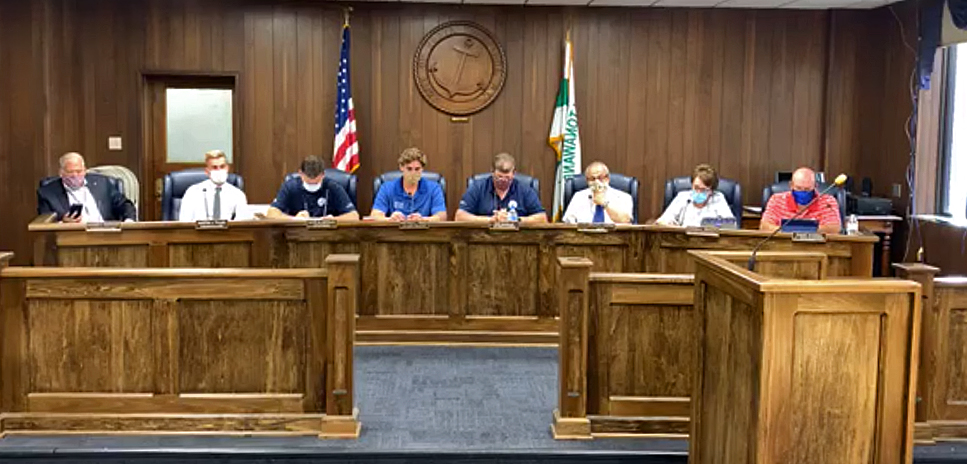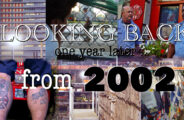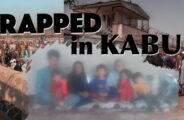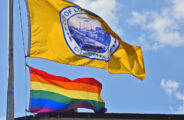NT’s “Proclamation Against Hate” is actually sweeping an uncomfortable racial history under the rug

“I’ve got a proclamation that we are not a sundown town,” said NT councilman Robert Pecoraro during the closing comments of last week’s workshop meeting.
Lately, talk of NT’s history of racial exclusion and intimidation has been generating much discussion on social media.
“There is no empirical evidence that we were ever a sundown city,” said Pecoraro. “And I’m TIRED (raises voice) of people saying that North Tonawanda was once a sundown city. It is NOT TRUE (raises voice) and I want to make sure everybody understands that.”
However, since there’s never been an involved public discussion of NT’s former status as a sundown town (which is defined as a system of informal threats as well as formal methods of keeping people of color out of a municipality after dark) it seems Pecoraro’s resolution is more an effort to shut down discussion and sweep an uncomfortable history under the rug.
“Between 1999 and 2004 I talked with a number of people from Tonawanda and North Tonawanda about their race relations history,” said James W. Loewen, author of the book “Sundown Towns: A Hidden Dimension of American Racism.”
“Even among fairly young people (30 to 50), I never met anyone who thought either town welcomed African Americans. Many had specific details to tell me.”
“In my considerable experience of talking with civic leaders in towns that used to be sundown towns, I find they fall into two categories: those who don’t want their town to be known as a sundown town, and those who don’t want their town to be a sundown town. Mr. Pecoraro seems to be of the former type.”
“I talked with two senior scholars at Cooperstown, one in the library, one in the archives, of the baseball museum and hall of fame,” Loewen said. “They both told me that there is no written proof that Organized Baseball (major and minor league) kept out African Americans before Jackie Robinson. They said this not to deny that it happened, only to point out that absence of written proof does not constitute proof of absence. Oral history from multiple sources with details is irrefutable.”
Loewen continued: “Recovering’ sundown towns need to take certain steps to transcend their white supremacist pasts. See my website for details, including examples from two cities not too different in population from North Tonawanda — Goshen, Indiana, and La Crosse, Wisconsin. Again, Mr. Pecoraro wants to take a step backward, not forward.”
“In this current climate, influenced by the events of the last couple of months, his resolution would deepen our racial divide, at least in his locality.”
The NT council will vote on the resolution tonight at 6:30 p.m., which will be live streamed on the City Clerk’s Facebook page.
Robert Pecoraro’s “Proclamation Against Hatred”
Whereas, some people consider North Tonawanda a city with a less than desirable past due to the belief that it is a “sundown” city. This belief dates to the mid-1800s when people of different ethnicities worked the Erie Canal. A cousin of then-President U.S. Grant came to North Tonawanda and demanded the “canal boys” to move his boat on a Sunday evening. There is no mention in the record of the ethnicity of the said “canal boys.” Other terms for workers on the Erie Canal included “Canawler”, “steersman”, “mule driver”, “lock tender”, and “hoggees” (children who led mules on the towpath). Sunday, as today, was considered a day of rest, especially after working two six-hour shifts or “tricks” daily. The “canal boys” refused to assist this man with his cargo. A fight broke out with fists and progressed into knives; when it was over, the “canal boys” where ordered out of the City due to the fight. Most “canawlers” were transient, moving along the towpath on the circuitous route from Albany to Buffalo and back.
Whereas, to our knowledge, never was a law passed codifying a “sundown” order and therefore there was no enforcement. The City’s Wikipedia page highlights the city as a sundown town, according to James W. Loewen, an American historian best known for his 1995 book Lies My Teacher Told Me. Our North Tonawanda City Historian, Mr. Joseph Midura, could find no substantiating evidence to Mr. Loewen’s claim. Regardless of the evidence, the North Tonawanda City leadership stands against racism of any kind,
Whereas, during the Common Council Session on August 20, 2019, the Council voted unanimously rejecting the “perpetuation of hatred and bigotry in our communities, condemn acts and statements of hate and intolerance, and reinforce our commitment to eradicating racist practices and acts of malice that propagate hate, incite fear, and promote violence in our communities,”
Resolved, the elected leaders from the City of North Tonawanda encourage others to be empathetic toward those of different creeds, color, and life experience. We can utilize this opportunity to include everyone, unite the community as one, and all work together to strengthen our community. We hereby choose to unite the community as one as we look to the future.

































